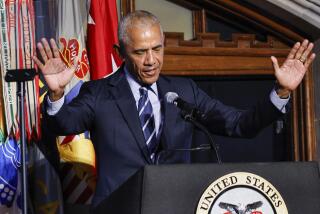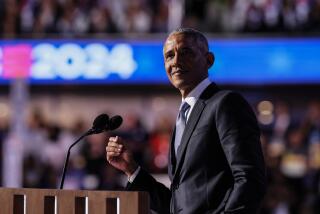Obama sees hope for global goodwill
- Share via
CHICAGO — Barack Obama says his presidency is an opportunity for the United States to spread a message of tolerance, starting the day of his inauguration and continuing with a speech he plans to deliver somewhere in the Muslim world.
And when he takes the oath of office Jan. 20, he plans to be sworn in like other presidents, using his full name: Barack Hussein Obama.
“I think we’ve got a unique opportunity to reboot America’s image around the world and also in the Muslim world in particular,” Obama said Tuesday, promising an “unrelenting” desire to “create a relationship of mutual respect and partnership in countries and with peoples of goodwill who want their citizens and ours to prosper together.”
The world, he said, “is ready for that message.”
In a wide-ranging interview, Obama discussed his strategy for his first year in office, vigorously defended his choice for attorney general and reflected on his role as the first African American to be elected president.
Obama’s first newspaper interview since his Nov. 4 election came just hours after Illinois Gov. Rod R. Blagojevich was arrested on a federal conspiracy complaint. The complaint alleges that Blagojevich essentially tried to auction off the appointment to replace Obama in the U.S. Senate. The president-elect declined to speak about any discussions between his representatives and those of the governor, a fellow Democrat.
Obama said he had never spoken personally to Blagojevich about his possible replacement, either before or since his victory. Shortly after the interview ended Tuesday afternoon, Obama’s transition office released a statement saying that top advisor David Axelrod misspoke last month when he said Obama had talked with Blagojevich about the Senate vacancy.
Citing an “ongoing investigation” into the matter, Obama said he considered it inappropriate to talk further about the situation.
As the Blagojevich drama unfolded in the federal courthouse, Obama lounged in an armchair in his spare black and gray office, a scattering of peanut shells from his afternoon snack littering the floor.
Obama said the country must take advantage of a unique chance to recalibrate relations around the globe, through diplomacy that emphasizes inclusiveness and tolerance as well as an unflinching stand against terrorism.
“The message I want to send is that we will be unyielding in stamping out the terrorist extremism we saw in Mumbai,” Obama said, adding that he plans to give a major address in an Islamic capital as part of his global outreach.
Though world events and economic winds have made his agenda all the more challenging, Obama kept close counsel on how he plans to move forward.
He would not commit to specific plans on matters as varied as free trade, unionization and illegal immigration. Instead, he said, his nominees and advisors are studying the issues and will report back with recommendations.
Asked if he would support the extension of the fence between the U.S.-Mexico border, Obama deferred to his nominee for the Homeland Security Department, Janet Napolitano.
In similar fashion, he sidestepped questions about whether he would move quickly on promises to rework the North American Free Trade Agreement or push the so-called card-check law that would make it easier for unions to organize.
“My economic team is going to put together a package on trade and on worker issues,” he said. “That will be presented to me. I don’t want to anticipate right now what sequences will be on these issues.”
Likewise, he offered no hints about future Cabinet appointments, but voiced strong support for Eric H. Holder Jr., his nominee for attorney general, by batting away concerns about Holder’s role in the controversial pardon of fugitive financier Marc Rich at the end of Bill Clinton’s presidency.
“Everybody who looks at his record says the guy was an outstanding attorney, an outstanding prosecutor, an outstanding judge, an outstanding No. 2 at the Justice Department,” Obama said. “And Eric has acknowledged the Rich pardon was a mistake on his part, not having caught that earlier.
“I agree with him,” Obama said. “I think it was a mistake. But when you look at the totality of his experience, there’s no doubt he’s going to be an outstanding attorney general.”
Some liberal supporters have expressed disappointment over some of Obama’s choices, like the one to retain Robert M. Gates as secretary of Defense. But the president-elect said his backers had no cause for concern.
He is steadfast on his “agenda of change,” he said.
“On all the promises that I made during the campaign, there has been no sense I’m backing off,” he said. “What I’m putting in place is a Cabinet of extraordinarily qualified, competent people who would not have accepted my offer for them to join my administration unless they believed in my vision.”
Obama is planning his administration mostly in a suite of offices in the federal building, spare in decor but replete with comforting remnants of his two years on the campaign trail. On his bookshelf are two basketballs, and there’s a third by the door. Just outside his personal office sits Reggie Love, the former college athlete who does double duty as personal assistant and basketball partner.
Most of the transition team is at work in Washington, leaving Obama to contemplate issues great and small in his Chicago headquarters, where Secret Service agents outnumber staff members.
One simple matter for the president-elect comes down to three little words, and on them he has made up his mind: He won’t shrink from using his full name when he takes the oath of office.
During the campaign, Obama’s detractors often invoked his middle name in an attempt to paint him as a Muslim. Obama, a Christian, doesn’t care.
“I think the tradition is that they use all three names, and I will follow the tradition, not trying to make a statement one way or another,” he said. “I’ll do what everybody else does.”
And then there are the grand issues, like the burden placed on him by history. As the first African American president, he acknowledges, he thinks about it.
“The biggest challenges we face right now in improving race relations have to do with the universal concerns of Americans across color lines,” he said. “If we are creating jobs throughout this economy, then, you know, African Americans and Latinos, who are disproportionately unemployed, they’re going to be swept up in that rising tide.
“I think that, more than anything, is going to improve race relations,” he said.
Though he hasn’t taken on a singular spiritual advisor since parting with his controversial former pastor, the Rev. Jeremiah A. Wright Jr., Obama said he had found inspiration in a “prayer circle” of supportive clergy leaders.
Leaders on that regular prayer phone call toward the end of the campaign included Bishop T.D. Jakes of the Dallas-based mega-church the Potter’s House, Pastor Rick Warren of the Saddleback mega-church in Orange County, and the Rev. Joseph Lowery of the Southern Christian Leadership Conference.
Obama said that he and his wife, Michelle, hadn’t gone church-shopping in Washington yet, mainly because they were trying to pull off a massive move without losing anything -- especially, he joked, either of their children.
Even when in the White House, Obama said, he doesn’t plan to sever ties to home. He made reference to former President George H.W. Bush’s White House getaway -- Kennebunkport, Maine.
“Let me explain to you, my Kennebunkport is on the South Side of Chicago,” he said. “Our friends are here. Our family is here. We are going to try to come back here as often as possible . . . at least once every six weeks or couple months.”
--
--(BEGIN TEXT OF INFOBOX)
Expectations
Most Americans think Barack Obama will meet only some of the goals he outlined in his campaign, according to a new Times/Bloomberg poll.
(Among all respondents)
All*: 1%
Many: 26%
Some: 44%
Few: 25%
None*: 2%
Don’t know: 2%
* Answer volunteered
Source: L.A. Times/Bloomberg Poll
More to Read
Sign up for Essential California
The most important California stories and recommendations in your inbox every morning.
You may occasionally receive promotional content from the Los Angeles Times.











